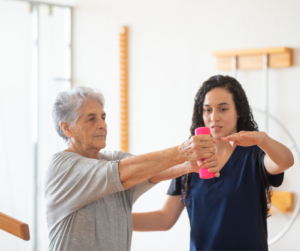The Heart of Recovery: Cardiac Rehabilitation for Seniors
 Cardiovascular diseases (CVD) continue to rank among the world’s top causes of death, with older adults being more susceptible. Cardiac rehabilitation, however, is a ray of hope that shines through the clouds of heart-related illnesses. This systematic program, which is sometimes disregarded, has enormous potential to help seniors not only rehabilitate but also live better lives. This blog explores the importance of cardiac rehabilitation for seniors and the significant impact it can have on their lives. It also focuses on how having companion care at home can also help.
Cardiovascular diseases (CVD) continue to rank among the world’s top causes of death, with older adults being more susceptible. Cardiac rehabilitation, however, is a ray of hope that shines through the clouds of heart-related illnesses. This systematic program, which is sometimes disregarded, has enormous potential to help seniors not only rehabilitate but also live better lives. This blog explores the importance of cardiac rehabilitation for seniors and the significant impact it can have on their lives. It also focuses on how having companion care at home can also help.
Understanding Cardiac Rehabilitation
Following a heart attack, cardiac rehabilitation is a comprehensive program intended to improve the social, psychological, and physical health of the participant. A multidisciplinary approach is usually used, including nutrition counseling, stress management strategies, exercise instruction, information on heart-healthy lifestyle choices, and psychosocial support. Additionally, seniors are given steps to follow at home, which companion care at home may assist with.
What Do Seniors Gain from Cardiac Rehabilitation?
While no two situations are the same, there are some common benefits that seniors may gain from cardiac rehabilitation, especially when they have the support of loved ones and companion care at home.
- Physical Rehabilitation: After a heart attack or surgery, seniors frequently experience physical difficulties. Cardiac rehabilitation offers specialized exercise programs under the supervision of qualified professionals. These workouts aim to gradually improve strength, flexibility, endurance, and cardiovascular fitness. This can play a critical role in helping seniors regain their physical strength and resilience, which will facilitate daily duties and lower their chance of experiencing cardiovascular problems in the future.
- Education and Lifestyle Changes: When it comes to heart health management, knowledge truly is power. Seniors who participate in cardiac rehabilitation programs gain important knowledge about heart disease, risk factors, drugs, and ways to avoid issues down the road. They also gain knowledge on how to manage stress, give up smoking, choose better foods, and live a generally heart-healthy lifestyle. This education and the help seniors get from companion care at home give them the knowledge they need to take control of their health and make decisions that can greatly improve their prognosis.
- Psychological Support: Coping with a cardiac event can have a negative impact on mental health, especially for older adults who may already be juggling other age-related issues. Cardiac rehab offers psychological support in the form of counseling, support groups, and stress management techniques. In addition to assisting seniors in overcoming worry, despair, or terror associated with their illness, this support also promotes a sense of companionship and encouragement among members.
- Social Interaction: During periods of recuperation, seniors may experience feelings of loneliness or isolation. As participants in cardiac rehabilitation programs come together with common experiences and objectives, they present opportunities for social engagement and peer support. Developing relationships with people who share their experiences can improve adherence to the program, motivation, and morale, all of which contribute to improved results. Additionally, having companion care at home offers much-needed socialization.
Cardiac rehabilitation has great potential to aid in the healing process and improve the quality of life for seniors suffering from heart-related conditions. Through the treatment of psychological, social, and physical components of recovery and support from home care, these programs enable seniors to take back control of their health and lead more fulfilling lives.
If you or someone you know needs Companion Care at Home in Foley, AL, please contact the friendly caregivers at Hughes Home Care. We provide quality and affordable care for your elderly loved ones in our community. Serving Mobile & Baldwin County. Call us today at (251) 517-9901
- Risk Factors that Increase the Likelihood of Heart Failure - April 11, 2025
- Is it Possible for Seniors to Eat 30 Plants a Week? - March 25, 2025
- Healthy Aging: Why Remaining Active Matters - March 7, 2025
